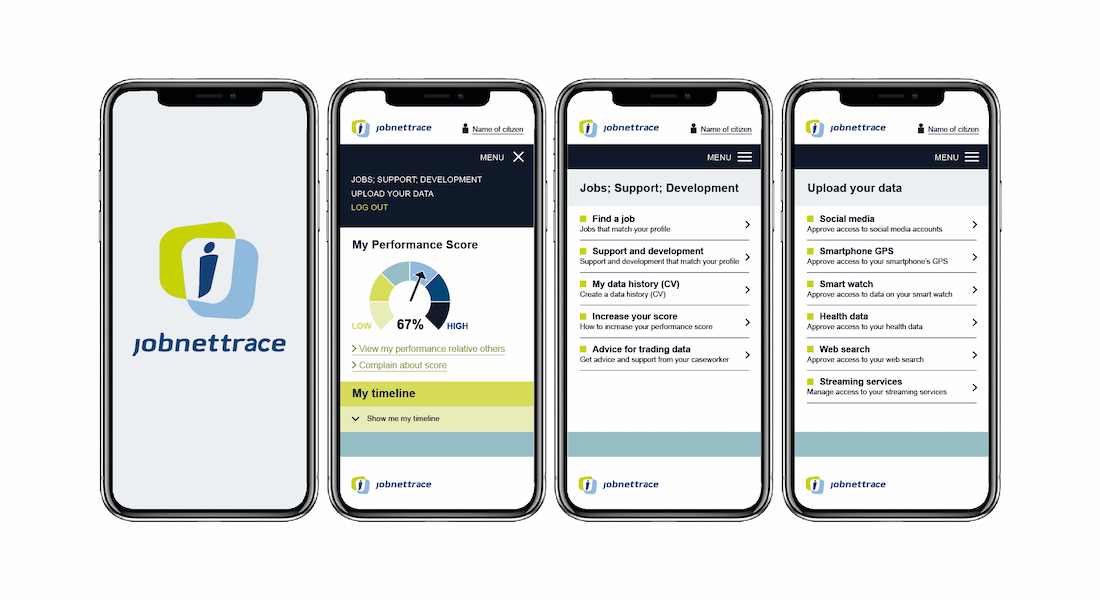Researchers receive award for fictional app
With the purpose of raising questions to the use of new types of data in job placement, Naja Holten Møller and Trine Rask Nielsen from the Department of Computer Science’s Software, Data, People, and Society research section have used the speculative method Design Fiction. Their awarded piece illustrates a scenario of the perception of data as a personal property that can be traded for welfare benefits.

More than 30 million Americans have become unemployed due to the COVID-19 pandemic. In Denmark, the increase in the number of individuals that have become unemployed during Covid-19 is around 50.000. This sudden scale and increase in caseload have put governmental job placement under pressure. An obvious response is to develop and take advantage of data-driven technologies to mitigate the challenges in job placement.
Meanwhile, before designing new data-driven technologies, critical perspectives should always be considered to make sure that we design systems responsibly, Assistant Professor Naja Holten Møller points out.
Together with her Research Assistant Trine Rask Nielsen, Naja Holten Møller developed the piece “Work of the unemployed – A Design Fiction” to present and discuss such critical perspectives. The piece recently received the award of Best Demo and Poster at this year’s European conference on Computer-Supported Cooperative Work (ECSCW 2020). It presents a fictional demo of a self-tracking app for unemployed individuals and raises questions about the use of new types of data in job placement, e.g. sensor tracking data on individuals’ locations.
- The idea is not to discuss whether to use this type of data or not in job placement but to discuss how our conceptual understanding of data as either individual property – or instead non-property – raises different questions depending on the perspective. In particular, we want to understand the potential ramifications of new types of data usage and how it potentially changes the relationship between the individual and caseworker, says Naja Holten Møller and continues:
- With our piece, we would like to encourages scholars, decision-makers, and software developers to explore the deeper implications of how we understand data as a concept as they work to handle sudden challenges such as the pandemic.
Asking the difficult questions
The design fiction is part of the EcoKnow research project focusing on data-driven technology in public services, led by Professor Thomas Hildebrandt. In the process of developing world-leading solutions for effective digitalization of casework, the researchers use Design Fiction as one of several methods.
Also, Naja Holten Møller and Trine Rask Nielsen are both part of the recently established Confronting Data Co-lab at DIKU. The lab gathers interdisciplinary researchers who aim to ask thorny questions about the data-driven technological directions that our society is leaning towards. Questions in relation to ethical dilemmas about how and why we as individual citizens are taken there, and whether we really want our society to go in that direction.
- Our goal is to be in a leading position in discussions about critical and responsible perspectives on data and society, and we are well underway with opportunities for engaging with the Co-lab, arranging events directed at collaborators, providing resources for academics- as well as non- academics, and establishing our Journal Club for PhD Students, says Naja Holten Møller.
In the video below, Trine Rask Nielsen explains the design fiction piece. Follow this link to download the paper.
Work of the ‘Unemployed’- A Design Fiction from Confronting Data Co-lab.
Related News
Contact
Naja Holten Møller
Assistant Professor
Software, Data, People & Society section
naja@di.ku.dk
Trine Rask Nielsen
Research Assistant
Software, Data, People & Society section
trn@di.ku.dk
What is Design Fiction?
Design Fiction or speculative design is a relatively new method and research paper genre within Computer Science that has emerged from the increasing concern for how technology affects our society. Thus, as explained by the ACM, Design Fiction aims to make explicit what the future paths towards which technology research and design are working. What values, assumptions, narratives, commitments, etc. tacitly drive technology research? How can envisioning fictional configurations of technology and humans help elucidate alternatives? Design Fictions provide an opportunity to explore potentially negative implications of technology while working to concretize alternative paths towards a desirable technological future. Design Fiction was in 2020 published as an independent genre by the Association for Computer Machinery (ACM), the world's largest educational and scientific computing society.
